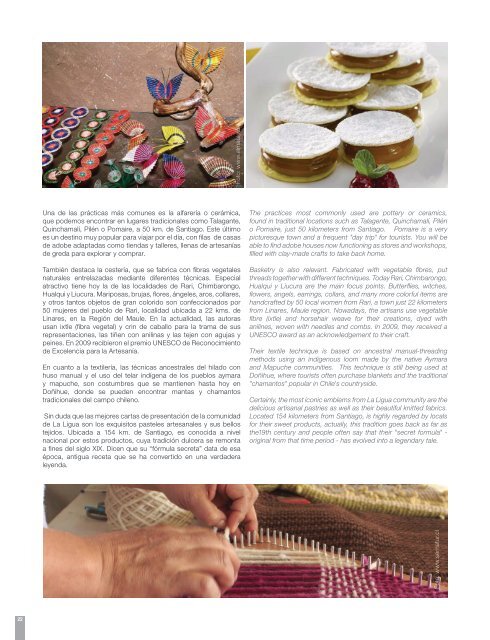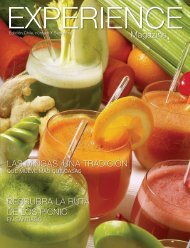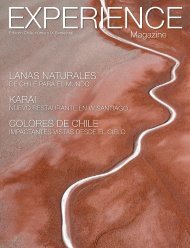You also want an ePaper? Increase the reach of your titles
YUMPU automatically turns print PDFs into web optimized ePapers that Google loves.
Foto: www.sernatur.cl<br />
Foto: www.elmaule.cl<br />
Una de las prácticas más comunes es la alfarería o cerámica,<br />
que podemos encontrar en lugares tradicionales como Talagante,<br />
Quinchamalí, Pilén o Pomaire, a 50 km. de Santiago. Este último<br />
es un destino muy popular para viajar por el día, con filas de casas<br />
de adobe adaptadas como tiendas y talleres, llenas de artesanías<br />
de greda para explorar y comprar.<br />
También destaca la cestería, que se fabrica con fibras vegetales<br />
naturales entrelazadas mediante diferentes técnicas. Especial<br />
atractivo tiene hoy la de las localidades de Rari, Chimbarongo,<br />
Hualqui y Liucura. Mariposas, brujas, flores, ángeles, aros, collares,<br />
y otros tantos objetos de gran colorido son confeccionados por<br />
50 mujeres del pueblo de Rari, localidad ubicada a 22 kms. de<br />
Linares, en la Región del Maule. En la actualidad, las autoras<br />
usan ixtle (fibra vegetal) y crin de caballo para la trama de sus<br />
representaciones, las tiñen con anilinas y las tejen con agujas y<br />
peines. En 2009 recibieron el premio UNESCO de Reconocimiento<br />
de Excelencia para la Artesanía.<br />
En cuanto a la textilería, las técnicas ancestrales del hilado con<br />
huso manual y el uso del telar indígena de los pueblos aymara<br />
y mapuche, son costumbres que se mantienen hasta hoy en<br />
Doñihue, donde se pueden encontrar mantas y chamantos<br />
tradicionales del campo chileno.<br />
Sin duda que las mejores cartas de presentación de la comunidad<br />
de La Ligua son los exquisitos pasteles artesanales y sus bellos<br />
tejidos. Ubicada a 154 km. de Santiago, es conocida a nivel<br />
nacional por estos productos, cuya tradición dulcera se remonta<br />
a fines del siglo XIX. Dicen que su “fórmula secreta” data de esa<br />
época, antigua receta que se ha convertido en una verdadera<br />
leyenda.<br />
The practices most commonly used are pottery or ceramics,<br />
found in traditional locations such as Talagente, Quinchamalí, Pilén<br />
o Pomaire, just 50 kilometers from Santiago. Pomaire is a very<br />
picturesque town and a frequent "day trip" for tourists. You will be<br />
able to find adobe houses now functioning as stores and workshops,<br />
filled with clay-made crafts to take back home.<br />
Basketry is also relevant. Fabricated with vegetable fibres, put<br />
threads together with different techniques. Today Rari, Chimbarongo,<br />
Hualqui y Liucura are the main focus points. Butterflies, witches,<br />
flowers, angels, earrings, collars, and many more colorful items are<br />
handcrafted by 50 local women from Rari, a town just 22 kilometers<br />
from Linares, Maule region. Nowadays, the artisans use vegetable<br />
fibre (ixtle) and horsehair weave for their creations, dyed with<br />
anilines, woven with needles and combs. In 2009, they received a<br />
UNESCO award as an acknowledgement to their craft.<br />
Their textile technique is based on ancestral manual-threading<br />
methods using an indigenous loom made by the native Aymara<br />
and Mapuche communities. This technique is still being used at<br />
Doñihue, where tourists often purchase blankets and the traditional<br />
"chamantos" popular in Chile's countryside.<br />
Certainly, the most iconic emblems from La Ligua community are the<br />
delicious artisanal pastries as well as their beautiful knitted fabrics.<br />
Located 154 kilometers from Santiago, is highly regarded by locals<br />
for their sweet products, actually, this tradition goes back as far as<br />
the19th century and people often say that their "secret formula" -<br />
original from that time period - has evolved into a legendary tale.<br />
<br />
<br />
<br />
<br />
<br />
<br />
<br />
<br />
22

















